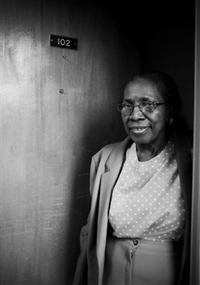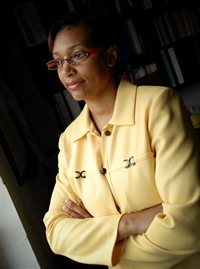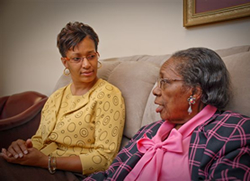Efforts to Improve Health Care for African Americans Unites Neighborhood Leaders, Researchers

Bernice Washington has her finger on the pulse of her community. By working at a mental health center, learning about ways to treat alcoholism and becoming involved in the reformation of a neighborhood, Washington, a lifelong Tuscaloosan, got to know about the needs of her community. “All my life, everyone calls on me to round up people,” says Washington, 79. “I’m a people person.” Washington’s gregariousness and involvement in the Tuscaloosa community makes her just the kind of person Dr. Martha Crowther is looking for. Crowther’s research, as part of a new five-year Deep South Resource Center for Minority Aging Research, will be to seek out the “people persons” in rural communities. These people know who needs help and how to get help to them. Crowther’s aim is to build a database of these people so that other researchers can contact them to find subjects for subsequent studies. “We’re trying to build a sustainable infrastructure that’s based on community professionals, like nurse practitioners, social workers, pastors — people who know what the needs are,” Crowther says. “We want to build this nice, deep infrastructure that will last once this five-year grant is over.” The center, one of six in the United States, receives a grant of $2.7 million from The National Institute on Aging, one of the agencies of the National Institutes of Health, and the National Center on Minority Health and Health Disparities. At UA, Crowther works with Dr. Patricia Parmelee, director of the Center for Mental Health and Aging, and Dr. John Higginbotham, director of the Institute for Rural Health Research. As part of the Deep South RCMAR, Drs. Jullet Davis and Shadi Martin were chosen as scholars in the Health Disparities Research Training Award Program. The overall intention of the RCMAR is to assess the state of health care for African Americans in rural and urban settings in the Deep South.

“We’ll be addressing exercise issues, diet and preventive health strategies,” Crowther says. “We’re also looking at how socio-economic issues play into the health disparities we see, particularly with regard to discrimination and trust.” This particular RMCAR is based at four campuses – UA, The University of Alabama at Birmingham, Tuskegee University and Morehouse School of Medicine in Georgia. Crowther, an associate professor of psychology in UA’s College of Arts and Sciences, is working in the Community Liaison Core, one of three cores in the resource center. Her research will focus on Alabama’s Black Belt, an impoverished area named for its rich, dark soil. Her role is to build a sustainable network of community professionals and, ultimately, research subjects that researchers who participate in the program can tap. Basically, that means the RCMAR researchers will be going out into the Black Belt to find people like Washington – people who know people. Once those people are identified, they can join a list or database that subsequent health researchers can tap. Researchers can contact the community leaders, who can then lead them to people who might participate in studies on health-care. Their answers can help researchers identify gaps or cracks in the system so rural and urban African-Americans can get access to better or more appropriate health care.

“People are having a hard time figuring out how to work with older African-Americans particularly in rural areas in a sustainable way,” she says. “How do you not only get enough subjects for your current study but then build the kind of relationships in the community that allows you to stay over time?” Crowther and her colleagues – through the assistance of people like Washington – look to provide some of the answers. Further Reading